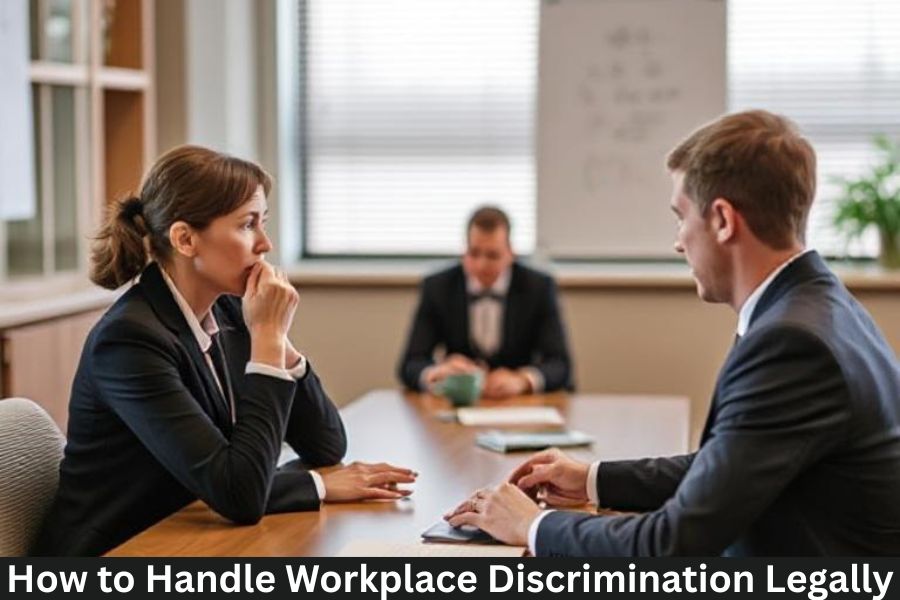Workplace discrimination is a serious issue that can affect not only your career but also your emotional and mental well-being. Discrimination in any form—based on race, gender, age, disability, sexual orientation, religion, or any other protected category—can create an unhealthy and hostile work environment. The good news is that there are legal procedures in place to protect employees from discrimination and harassment at work.
In this article, we will guide you on how to handle workplace discrimination legally and take the necessary steps to protect your rights while maintaining a professional demeanor.
What is Workplace Discrimination?
Workplace discrimination occurs when an employee or job applicant is treated unfairly based on their personal characteristics, such as race, gender, sexual orientation, religion, or age. This kind of discrimination can take place in various forms, including hiring, firing, promotions, compensation, job assignments, and other employment-related decisions.
Types of Workplace Discrimination:
- Race and Ethnicity Discrimination: Treating employees unfairly based on their race, ethnicity, or national origin.
- Gender and Sexual Orientation Discrimination: Unequal treatment based on gender, gender identity, or sexual orientation.
- Age Discrimination: Discriminating against employees based on their age, particularly if they are over 40.
- Disability Discrimination: Treating employees unfavorably because of physical or mental disabilities.
- Religious Discrimination: Unequal treatment based on an individual’s religion or religious practices.
Recognizing Workplace Discrimination
Before taking legal steps, it’s important to recognize whether you are truly facing discrimination. Discriminatory behavior can often be subtle and difficult to pinpoint, but some common signs include:
- Unequal Treatment: You are being passed over for promotions or raises despite your qualifications.
- Harassment: You are subjected to offensive comments, jokes, or behavior about your race, gender, or other protected status.
- Retaliation: You face negative consequences after reporting discrimination or filing a complaint.
- Unequal Policies: Company policies are applied unevenly, or you are subjected to different standards than others in your group.
If you notice these signs, it’s essential to act swiftly to protect your legal rights.
Steps to Take When You Face Workplace Discrimination
Document the Discrimination
One of the first steps in handling workplace discrimination is to document everything. Keeping a clear record will support your case if you need to take legal action later.
- What to Document:
- Date, time, and location of the incidents.
- Names of individuals involved in the discrimination.
- A description of the behavior or comments that were discriminatory.
- Any witnesses who saw or heard the discriminatory behavior.
- Any communication (emails, text messages, etc.) that might be relevant.
Report the Discrimination Internally
Most companies have an internal procedure for reporting discrimination, such as a Human Resources (HR) department or a designated compliance officer. Before jumping into legal action, try to resolve the issue internally.
- How to Report: Follow the company’s reporting procedure, which may involve filling out forms, sending emails, or having a meeting with HR. Make sure to keep copies of everything you submit and record the details of any conversations with HR.
- Why It’s Important: Reporting the discrimination internally gives your employer a chance to fix the problem before it escalates. It also shows that you attempted to resolve the issue within the company.
Understand Your Legal Rights
It’s crucial to understand your legal rights before taking further action. In the United States, there are several federal and state laws that protect employees from discrimination:
- Title VII of the Civil Rights Act of 1964: Protects against discrimination based on race, color, religion, sex, or national origin.
- Age Discrimination in Employment Act (ADEA): Prohibits age discrimination against workers 40 and older.
- Americans with Disabilities Act (ADA): Protects individuals with disabilities from discrimination.
- Equal Pay Act of 1963: Ensures equal pay for equal work regardless of gender.
- State Laws: Many states have their own anti-discrimination laws that provide additional protections.
Knowing which laws apply to your case will help you understand how strong your claim is and which steps you should take next.
When to Seek Legal Action
If internal channels don’t resolve the issue or if the discrimination continues, it might be time to seek legal action. Here are the steps to take:
Consult an Employment Lawyer
Before filing a formal complaint with a government agency, it’s advisable to consult with an experienced employment lawyer. An attorney can help you understand your legal options and whether you have a strong case.
- Why Consult a Lawyer: A lawyer specializing in employment law will have the knowledge and experience to assess your situation. They can advise you on the best legal course of action and help you navigate the legal system.
File a Complaint with the Equal Employment Opportunity Commission (EEOC)
If you believe that you’ve been the victim of discrimination, you can file a charge with the Equal Employment Opportunity Commission (EEOC), which is responsible for enforcing federal anti-discrimination laws.
- How to File a Complaint: You can file your complaint with the EEOC online, by phone, or in person at your local EEOC office. The EEOC will investigate your claim and determine whether there is enough evidence to move forward with legal action.
- Time Limits: It’s important to file your complaint within 180 days of the discrimination incident. However, if the discrimination is based on state or local laws, the deadline may be extended to 300 days.
Pursue Legal Action in Court
If the EEOC investigation does not result in a satisfactory outcome, or if they issue a “right to sue” letter, you may have the option to pursue a lawsuit in court. Your lawyer will guide you through this process, which may involve filing a formal legal complaint against your employer.
What Happens During a Discrimination Lawsuit?
- Investigation: Both sides will present evidence, and the court will examine whether discrimination occurred.
- Settlement: Often, companies prefer to settle these cases out of court to avoid prolonged litigation and negative publicity.
- Outcome: If you win the lawsuit, you may be entitled to damages such as back pay, emotional distress compensation, and reinstatement to your position.
Protecting Yourself After Filing a Complaint
After reporting discrimination or filing a complaint, you may experience retaliation from your employer. Retaliation is illegal, and it includes any adverse action like being fired, demoted, or harassed because you filed a discrimination claim.
If you suspect retaliation, document everything and report it immediately. You can file a retaliation complaint with the EEOC, and your lawyer can help you protect your rights.
Conclusion
Dealing with workplace discrimination can be emotionally and mentally taxing, but knowing your rights and following the legal process can empower you to handle the situation effectively. From documenting discriminatory behavior to filing formal complaints and seeking legal representation, you can take the necessary steps to address discrimination and protect your professional future. Always remember, no one should have to face discrimination at work, and there are resources available to help you navigate these challenges.
FAQs
1. How do I prove workplace discrimination?
You can prove workplace discrimination by documenting incidents of unequal treatment, keeping a record of dates, times, and individuals involved, and gathering witness statements or evidence like emails.
2. What should I do if my employer ignores my discrimination complaint?
If your employer ignores your complaint, escalate it to a higher authority or file a charge with the Equal Employment Opportunity Commission (EEOC).
3. Can I be fired for filing a discrimination complaint?
No, it is illegal for your employer to fire you in retaliation for filing a discrimination complaint. If this happens, you can file a retaliation claim.
4. How long do I have to file a discrimination complaint?
Generally, you have 180 days from the date of the discriminatory act to file a complaint with the EEOC, although some states allow 300 days.
5. Can I sue my employer for discrimination?
Yes, if your case is not resolved through the EEOC or other methods, you may file a lawsuit with the help of an attorney.



